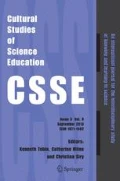Abstract
This study explores through a naturalistic inquiry the tensions between a science professor’s two enacted identities. More specifically, this study looks at how a biology professor’s identity-in-practice shifts and evolves over time through collaborations with a science education professor. These shifts were marked by an emphasis on teaching, rather than solely a focus on science. Data were collected through formal interviews and notes taken during planning sessions that took place between the biology professor and the science educator. Findings reveal that although the biology professor is able to reconcile both his science and teacher identity, structural elements of his workplace do not encourage him to enact his teacher identity. Recommendations for college science teaching are discussed.
Similar content being viewed by others
References
Abbas, A. O., Goldsby, K. A., & Gilmer, P. J. (2002). Promoting active learning in a university chemistry classroom. In P. Taylor, P. Gilmer, & K. Tobin (Eds.), Transforming undergraduate science teaching: Social constructivist perspectives (pp. 183–210). New York, NY: Peter Lang Publishing.
Balinsky, M. G. (2007). Forging an identity: Four science doctoral students in a collaborative partnership with K-12 science teachers. Unpublished Dissertation, Florida State University, Tallahassee, FL.
Bernard, H. R. (2002). Research methods in anthropology: Qualitative and quantitative approaches. Walnut Creek, CA: Altamira Press.
Duggan-Haas, D. (2000). Scientists are from mars, educators are from Venus: Relationships in the ecology of science teacher preparation. Unpublished doctoral dissertation. East Lansing, Michigan State University.
Gee, J. (2002). Identity as an analytic lens for research in education. Review of Research in Education, 25, 99–125.
Guba, E. G., & Lincoln, Y. S. (1989). Fourth generation evaluation. Newbury Park, CA: Sage.
Hass, P., & Keeley, S. (1998). Coping with faculty resistance to teaching critical thinking. College Teaching, 46(2), 63–67.
Lincoln, Y. S., & Guba, E. G. (1985). Naturalistic inquiry. Beverly Hills, CA: Sage.
Lord, T. (2008). We know how to improve science understanding in students, so why aren’t college professors embracing it? Journal of College Science Teaching, 38(1), 66–68.
Rogoff, B. (1990). Apprenticeship in thinking: Cognitive development in social context. New York, NY: Oxford University Press.
Roth, W. M., & Tobin, K. (Eds.). (2007). Science, learning, identity: Sociocultural and cultural historical perspectives. Rotterdam: Sense.
Russell, P., & French, D. P. (2002). Factors affecting participation in traditional and inquiry-based laboratories: A description based on observations and interviews. Journal of College Science Teaching, 31(4), 225–229.
Scantlebury, K. (2002). A feminist pedagogy in undergraduate science: Conflicting concepts. In P. Taylor, P. Gilmer, & K. Tobin (Eds.), Transforming undergraduate science teaching: Social constructivist perspectives (pp. 117–144). New York, NY: Peter Lang Publishing.
Sewell, W. H. (1999). The concepts of culture. In V. E. Bonnell, A. H. Hunt, & R. Biernacki (Eds.), Beyond the cultural turn: New directions in the study of society and culture (pp. 35–61). Berkeley, CA: University of California Press.
Sfard, A., & Prusak, A. (2005). Telling identities: In search of an analytic tool for investigating learning as a cultural activity. Educational Researcher, 34(4), 14–22.
Siebert, E. D., Caprio, M. W., & Lyda, C. M. (1997). Effective teaching and course management for university and college teachers. Dubuque, IA: Kendall-Hunt Publishing.
Stake, R. E. (1995). The art of case study research. Thousand Oaks: Sage.
Taylor, P., Gilmer, P., & Tobin, K. (Eds.). (2002). Transforming undergraduate science teaching: Social constructivist perspectives. New York, NY: Peter Lang Publishing.
Vygotsky, L. S. (1978). Mind in society: The development of higher psychological processes. Cambridge, MA: Harvard University Press.
Author information
Authors and Affiliations
Corresponding author
Rights and permissions
About this article
Cite this article
Aydeniz, M., Hodge, L.L. Is it dichotomy or tension: I am a scientist. No, wait! I am a teacher!. Cult Stud of Sci Educ 6, 165–179 (2011). https://doi.org/10.1007/s11422-009-9246-x
Received:
Accepted:
Published:
Issue Date:
DOI: https://doi.org/10.1007/s11422-009-9246-x




